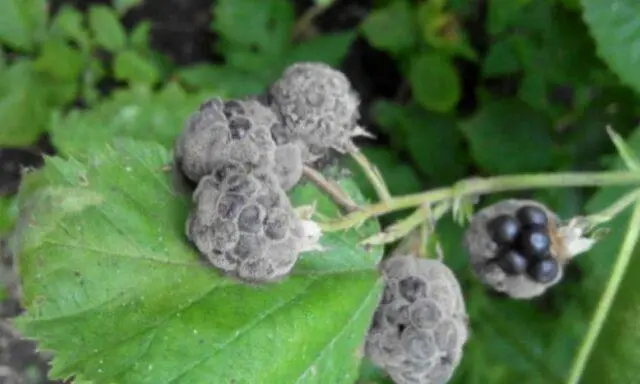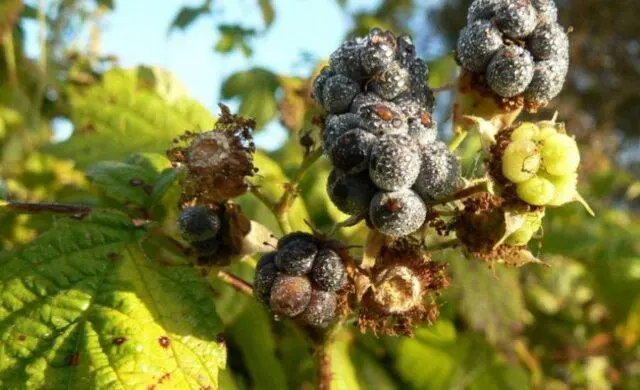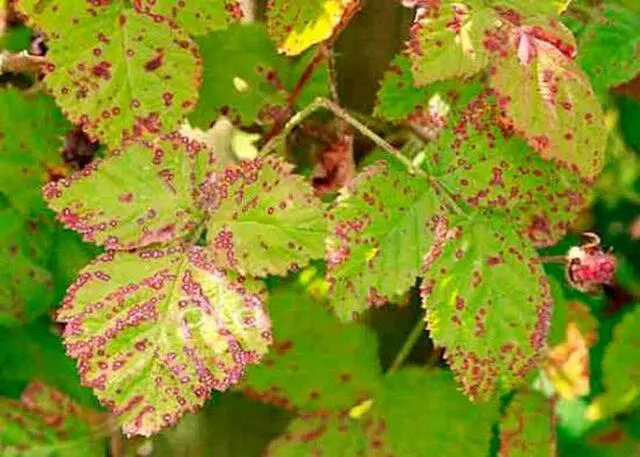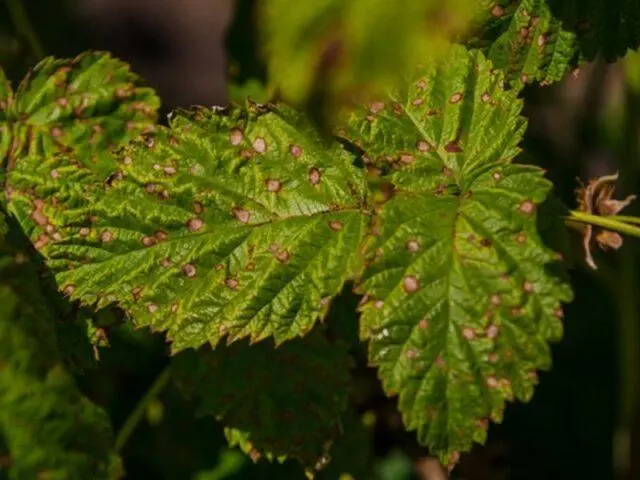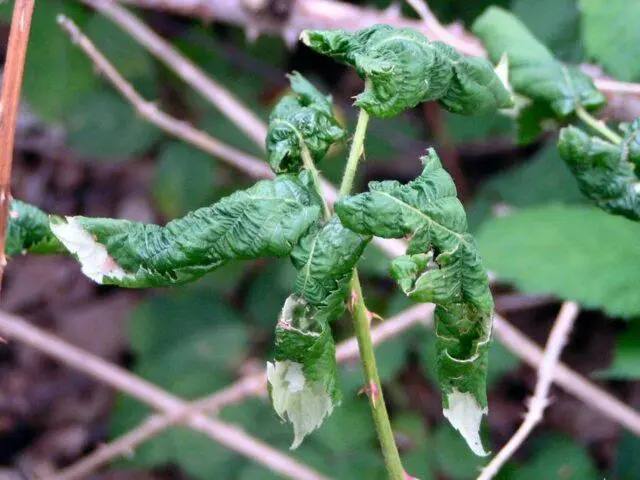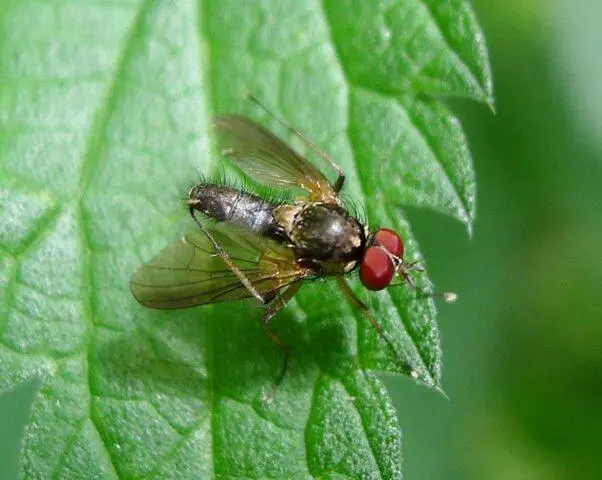Contents
Blackberry Doyle is a hardy variety of berry shrub with long fruiting. The plant is well suited for breeding in temperate climates, but you should familiarize yourself with key features before starting cultivation.
History of origin
Blackberry Doyle (Doyle’s) is an American variety known in culture relatively recently. Named after Tom Doyle, who first discovered an unusual plant in his own garden in 1970. The blackberry, grown on the American’s plot, brought a huge amount of fruit – up to 70 kg per bush. Upon further study, it turned out that the plant during reproduction perfectly retains its characteristics, like ordinary cultivars.
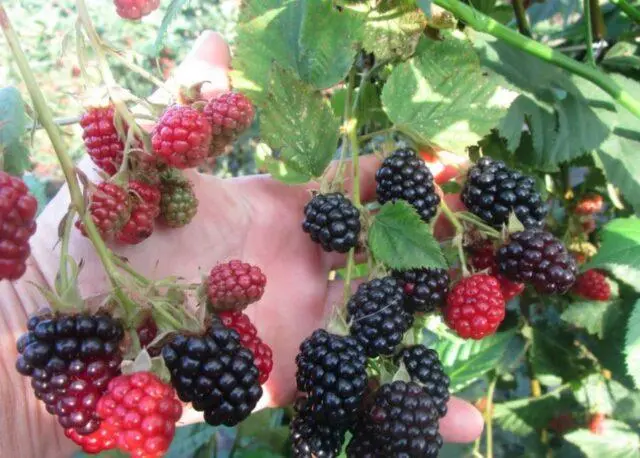
On the shoots of blackberry Doyle there are no thorns at all
For several years, breeders, along with the Doyle family, continued to study blackberries. The bushes of the new variety were presented at agricultural exhibitions and won recognition from visitors and experts. In 1994, Doyle’s blackberry received an official patent and went on sale around the world. To date, the variety is grown not only in America, but also in Europe, in the CIS countries and in Our Country.
Description of the Doyle blackberry bush and berries
Blackberry Doyle is a spreading, semi-erect shrub with horizontal shoots up to 4 m. The lower branches are longer than the upper ones, covered with complex palmate leaves, consisting of five separate plates.
From late July to mid-autumn, the plant bears fruit – rich black berries of medium size and slightly elongated shape. The variety has a pleasant aroma. The taste of Doyle’s blackberry is specific – sweetish with pronounced sourness. Berries are well refreshing, but they cannot be called dessert.
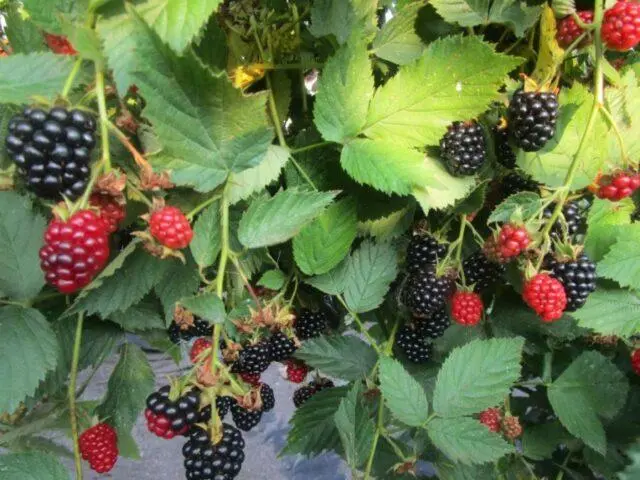
Blackberries Doyle reach 5-8 g by weight
Characteristics of blackberry Doyle
Before planting varietal blackberries on the site, it is necessary to study its main features. This will help determine if the plant meets specific needs.
Ripening time and yield
The Doyle blackberry variety ripens on average from the last days of July. The fruiting of the shrub is very long, continuing until the second decade of October and the first frosts.
With good care, one adult plant can produce 50 kg of berries or more. Up to 100 fruits are formed on a single blackberry brush, and a well-developed bush can have up to 300 such brushes. The berries do not fall from the branches for a long time, have good keeping quality and after picking they retain their marketable appearance for about a week. You can grow them not only for personal use, but also for sale.
Frost resistance
Blackberry Doyle demonstrates average frost resistance and tolerates cold snaps down to -30 ° C. Thanks to this, it can be grown in the Moscow region, in the middle lane and in the Urals. In Siberia, the culture is also developing well, but it requires winter shelter and warming of the root system.
Disease and pest resistance
Blackberry Doyle has strong immunity and rarely suffers from fungal diseases and garden parasites. But some diseases still pose a threat to her:
- Powdery mildew. A whitish coating appears on the leaves and fruits, the berries are deformed.

When powdery mildew is affected, the blackberry crop becomes unfit for consumption.
- Anthracnose. Gray spots with a purple border appear on the plates of the plant.

Anthracnose reduces the yield of blackberries and leads to the death of the plant
- Purple spotting. In blackberries, buds and leaves dry up, necrotic areas appear on the plates and trunk.

With purple spotting, blackberries may not form ovaries at all.
- Spider mite. The insect feeds on the juice of the plant and entangles the shoots with a thin cobweb.

The presence of a tick is indicated by yellow spots and brown dots on the leaves.
- Blackberry aphid. The pest draws juice from young stems and leaves, settles on the undersides of the plates.

When blackberry aphids are infected, the leaves of the culture are twisted and deformed.
- Raspberry stem fly. When attacked by an insect, the stems of the plant often turn black and rot at the tops.

Raspberry fly larvae burrow through blackberry shoots
For symptoms of fungal diseases, Doyle blackberries are treated with fungicides and Bordeaux mixture 2%. Spraying is carried out from early spring three times a season. An infusion of onion peel and a solution of laundry soap help well against pests; treatments are also performed several times at short intervals.
Advantages and disadvantages
The popular blackberry variety has positive qualities, but it also has weaknesses.
Pros: · high drought resistance; Very plentiful harvests unpretentiousness to growing conditions; resistance to fungi and pests; long fruiting until late autumn; absence of thorns; bushes do not give root shoots; · large and juicy fruits; · good frost resistance; fruits are stored for a long time. | Cons: berries are distinctly sour; seedlings are quite expensive; blackberries can suffer from powdery mildew, anthracnose and spotting; The variety remains young and is not fully studied. |
Overall, the benefits of the Doyle blackberry outweigh its drawbacks. But when planting a plant, it must be taken into account that the berries do not have dessert qualities and are poorly suited for fresh consumption.
Rules of landing
It is recommended to plant Doyle blackberries in open ground in the spring in early April after the soil has thawed. In warm regions and the middle lane, the procedure is also allowed in the fall. But in this case, planting is carried out no later than the beginning of October, otherwise the plant will not take root until the cold weather.
The rooting algorithm looks like this:
- In the selected area, two weeks before planting, they dig up the soil and prepare holes about 40 cm deep.
- Garden soil is mixed with river sand and peat and complex minerals are added.
- The holes are half covered with a substrate, and then a blackberry seedling is placed in the recess and its roots are straightened.
- The hole is filled with soil to the end and the plant is abundantly watered with 10-15 liters of water.
When planting several seedlings, 1,5 m of free space is left between them. Next to each plant, it is recommended to immediately dig in support pegs for tying branches.
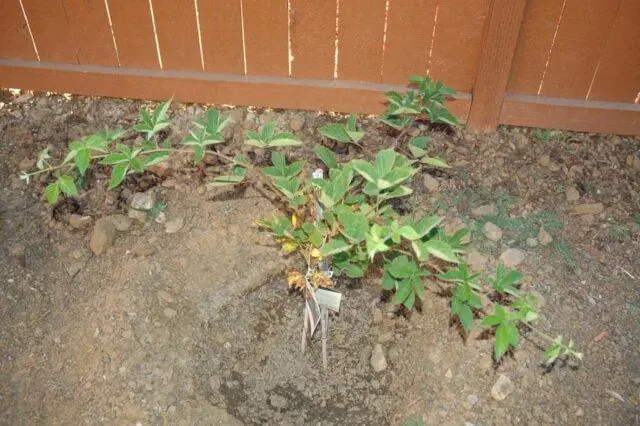
Doyle blackberry growth bud needs to be buried up to 8 cm
Doyle blackberry soil requires loamy and well-drained soil. Best of all, the shrub grows in sunny, but protected from the wind areas.
Features of care
Blackberry Doyle does not have special requirements for growing conditions. In the process of caring for a culture, you need to pay attention to several points:
- Watering. You need to moisten the plant as the soil dries. Usually contribute 15-20 liters of water weekly under the root. On rainy days, additional moisture is not carried out.
- Top dressing. For abundant fruiting, Doyle blackberries are recommended to be supplied with nitrogenous fertilizers in early spring, phosphorus in mid-July and potassium in the autumn.
- Loosening. Blackberry Doyle loves breathable light soils. After each watering, the earth at the roots of the plant must be loosened to a shallow depth, while simultaneously removing weeds.
- Pruning. Doyle’s blackberry is cut twice a season. In the spring, all frozen and dried branches are removed, and in the fall, diseased, weak and too old shoots that no longer participate in fruiting are cut off.
Methods of reproduction
There are several ways to propagate Doyle blackberries in the garden:
- Seeds. Dry grains of the plant are stratified in the refrigerator for two months. In spring, the seeds are sown in a shallow box and germinated at a low temperature until 3-4 leaves appear, after which they are transferred to the ground.
- cuttings. A green shoot about 20 cm long is cut along with two leaves, half is left from the top, and only part of the petiole is left from the bottom. The stalk is treated with a talker, which is prepared from the earth and the growth stimulator, taken in equal proportions. After that, the shoot is planted in a box filled with peat and perlite, and kept in a warm, humid place until fresh leaves appear. Then the blackberries begin to ventilate and after a week they are transferred to open ground.
- layering. The flexible lower shoot of the plant is laid on the ground and sprinkled with soil, leaving the top on the surface. To prevent the layer from straightening, it is fixed with a bracket or wire, mulched and watered for 1-2 months. In the fall, the shoot can be separated from the bush, and in the spring it can be transplanted to a new place.
Most often, vegetative propagation methods are used for Doyle blackberries. The seeds of the plant germinate poorly, in addition, the varietal characteristics of new seedlings are deteriorating.
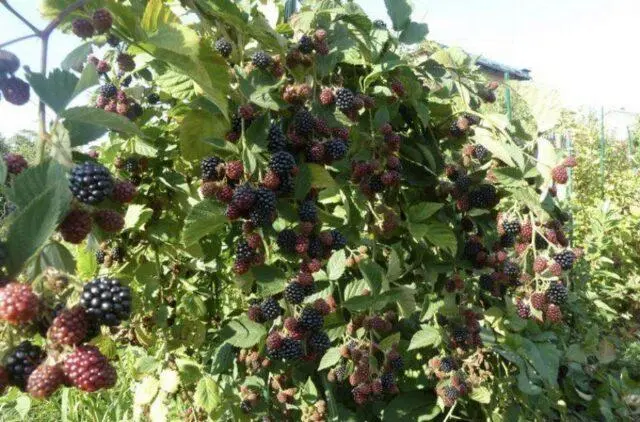
Variety Doyle does not give root shoots, so the plant cannot be propagated by offspring
Conclusion
Blackberry Doyle is one of the most productive and unpretentious varieties. It is easy to grow a crop, but its significant drawback is sour berries, which are mainly suitable for preparations and desserts.










